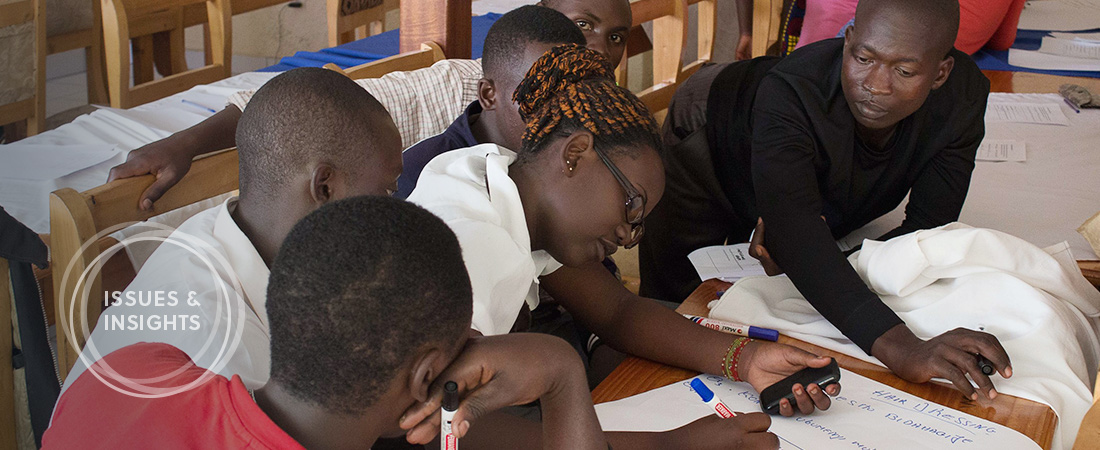Bridging the Skills Gap for Youth

Young people in Rwanda work to develop skills like good communication and teamwork, which are key to future job success.
What happens when school does not prepare students with the skills that are in demand? It’s a real question for millions of young people in sub-Saharan Africa, where half of all college graduates are unprepared for the workplace. This skills gap reflects the mismatch between what young people are learning and what industry needs, and it threatens to derail the economic promise of the region.
EDC’s Youth Workforce Development Team has been trying to close this gap through a new assessment that promotes the development of needed workforce skills. Here, team members Ann Hershkowitz and Rebecca Pagel talk about the impact the skills gap is having in the countries of Senegal, Rwanda, Uganda, and Tanzania, and how a new approach to assessment can better prepare young people for life and work.
Q: What does the skills gap look like in these sub-Saharan countries?
Hershkowitz: Technical and vocational schools prioritize the teaching of hard skills, such as masonry, carpentry, and electronics. But employers say that they can teach those skills. Instead, they want employees who are responsible, demonstrate solid work habits, and can communicate well with coworkers and clients. Young people with soft skills are poised to thrive in the quickly changing economies of these countries, but few schools explicitly teach these skills.
Q: Why are these skills not taught in school?
Hershkowitz: Education in these countries is still largely done by rote methods, which puts little emphasis on communication, collaboration, and critical thinking. Students simply do not have a chance to develop soft skills during their formal education. Fortunately, this situation is beginning to change.
Q: What is the cost of not teaching youth soft skills?
Hershkowitz: It’s huge. Financially, families sacrifice a lot to have their children go to school, with the idea that an education will improve their economic status. But it doesn’t always do that, especially without soft skills. And it’s demoralizing for young people when they can’t find work.
There is also a trickle-down effect. If school doesn’t prepare youth for work, then why should they go? We want to change that. We want to make school more relevant, so that it leads to something better.
Q: How can we make school more relevant?
Pagel: Schools have to focus more on the development of soft skills. In some countries, this is already underway as work readiness curricula that teach these skills—such as EDC’s Work Ready Now! —are increasingly being used. So that’s a strong start.
We are also developing a classroom-based assessment that enables teachers to better evaluate their students’ soft skills development and help them learn the skills they need to be successful. We want the assessment to be easy to use, support instruction, and promote the idea that assessment can be a tool for continuous improvement.
Q: How will this assessment be different?
Pagel: Many of the work readiness tests currently in use are essentially self-assessments. For example, they ask students to rate how much they like to talk to other people and how much alone time they need. But these tests are easy to fake, so they don’t always accurately assess the actual skills that youth have. And because most of the tests were developed in the West, they do not authentically reflect cultural norms and expectations.
Our assessment is different because we plan to use different question types—such as open-ended questions—that require students to apply their knowledge about a livelihood skill. For example, the test may ask students how they would resolve a challenge that arose during a group project. Or it may ask them about job-related expectations, such as honesty and timeliness.
Q: What changes are you hoping for?
Pagel: Our hope is that teachers will score these assessments and then use the results to help students improve their livelihood skills. We plan on providing support to support teachers, too. It’s not an effort that will change fortunes overnight. But we believe that it can complement some of the current work to bring soft skills education into more schools, which will help young people in these countries become productive participants in the economy.